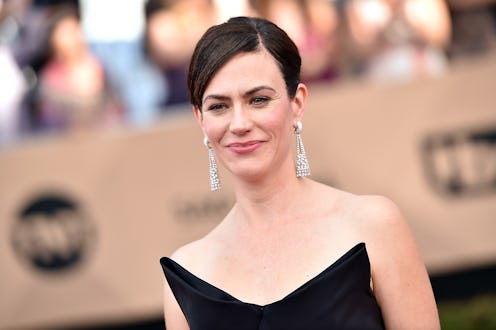Entertainment
Maggie Siff Struggles With The Idea Of "Having It All" Too

In an interesting change of pace, Billions actor Maggie Siff is going down the indie route for her latest film project. Taking a breather from prestige television dramas, Siff plays Anna, a 40-something actor with a successful career who feels her life is lacking a spark, in the new film A Woman, A Part. In an attempt to find personal as well as professional satisfaction, Anna goes back to her old New York City stomping grounds to regain that balance. And when I speak to her ahead of the film's release, Siff admits that she's all too familiar with the struggle to find balance in her own life, especially when it comes to balancing career success and a fulfilling personal life.
"Sometimes it's hard to know, for myself, whether that’s pressure I put on myself or pressure that the culture is putting on you," the actor says. "I feel like women, for sure carry the burden, especially now, of wanting have it all and being told that you can have it all. [The idea is that] you can have rich, powerful creative lives and family and children and relationships."
At the beginning of A Woman, A Part, Anna is dealing with a kind of fractured life, juggling a lively acting career (despite the fact that her role on a hit TV isn't exactly the most well-rounded), a chronic illness, and a general feeling of disillusionment. She feels that the trade-offs she's made — creative, personal, and professional — have thrown her off track, and, as Siff notes, they leave Anna feeling unfulfilled despite having the markers of success connects to a dream so many women are fed: that we can have it all and we'll be the happier for it.
"I think that there is — I have felt this — this promise that has been given to me that I can have it all. But I also think that it's a perfectionism that I, and perhaps many of my friends, subject ourselves to," Siff says. This kind of real-life pressure is a foundational element to A Woman, A Part, which crucially seeks to examine how women can be split up by various aspects of their lives, leaving them feeling disconnected from their entire self.
"What ends up happening is that you do end up feeling fractured," Siff explains. "You’re like, ‘Well this part of my life feels really rich but this part of my life […] should have lived up to that standard.’ It’s an exacting and excruciating standard that we’re all striving for."
This examination of how women break themselves down, attempt to perfect, and then reassemble into the ideal we've been shown as an example is part of what makes A Woman, A Part so compelling. The other compelling piece here is Siff's own involvement in Anna's story. As executive producer, she had a great deal of input in how director Elisabeth Subrin wrote and brought Anna to life. Says Siff, "I just talked a lot about my own experience and let [Subrin] know when my barometer was saying in terms of whether something felt true or false."
The actor's own experience in Hollywood proved valuable to Subrin, who attempted to bring the life of a real, working actor into the realm of reality and away from dreamier depictions that so often populate movies. "She had a lot of questions about how the business worked and would this be realistic, would that be realistic?" Siff recalls. Occasionally, these discussions would take a turn for the deeply personal: "She also had a lot of questions like, ‘What does the existential despair of an actor or actress in Hollywood look like, feel like?’" adds Siff. "There was a certain amount that I could contribute to that conversation and my observations of other people as well."
As Siff poured her past experiences into the role to vividly render Anna, Subrin carved a raw but sympathetic portrait of how women grapple with the demands of life and what society expects of them. The result of this collaboration, this film, is an absolute must-see.